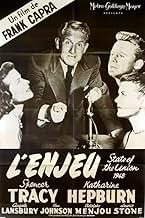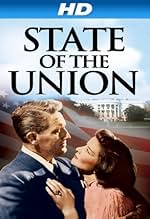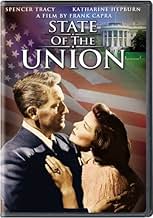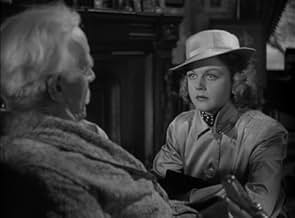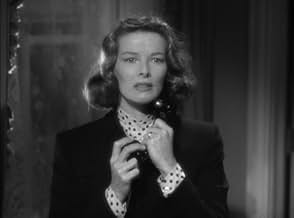IMDb RATING
7.2/10
4.4K
YOUR RATING
An industrialist is urged to run for President, but this requires uncomfortable compromises on both political and marital levels.An industrialist is urged to run for President, but this requires uncomfortable compromises on both political and marital levels.An industrialist is urged to run for President, but this requires uncomfortable compromises on both political and marital levels.
Georgie Nokes
- Grant Matthews Jr.
- (as George Nokes)
Storyline
Did you know
- TriviaClaudette Colbert was originally cast to play Mary Matthews. A few days before production began, Producer and Director Frank Capra fired her from this movie because she refused to work into the evening. Capra then hired Katharine Hepburn on Spencer Tracy's suggestion.
- GoofsKatharine Hepburn's name is misspelled in the opening credits as "Katherine". This is the result of the original MGM opening credits (MGM was the original theatrical distributor) being replaced by haphazardly-designed replacement credits when MGM's distribution rights expired.
- Quotes
Mary Matthews: Oh, that's silly. No woman could ever run for President. She'd have to admit she's over 35.
- Crazy creditsWhen this film was reissued, new titles and credits were printed. The original end cast listing was retained, so the cast names which are misspelled in the reissue's opening credits are spelled correctly in the closing cast list.
- ConnectionsFeatured in MGM: When the Lion Roars (1992)
Featured review
`Is there any difference between Democrats and Republicans?' `The difference is that they're in and we're out.' -- A line from State of the Union, one of only a handful of political films to use direct partisan language.
Based on a 1945 play by Howard Lindsay and Russell Crouse, State of the Union marked Frank Capra's return to the political genera. This film is also the third of nine pictures featuring Spencer Tracey and Katharine Hepburn. In this outing, Tracey plays Grant Matthews, a famous aircraft tycoon courted by the Republican Party to become their candidate for President of the United States. The film's title, in addition to referring to the country, is also a metaphor for Matthews' relationship with his wife, Mary (Hepburn). The two are having marital problems sparked by Matthews' affair with a newspaper heir Kay Thorndyke (played by a 22-year-old Angela Lansbury convincingly portraying a woman in her forties).
Once the campaign is underway, the classic theme of a good man sacrificing his ideals in order to win begins to surface. Matthews' speeches are reworked as to not offend any big political establishments (e.g. big business, labor, agriculture, etc.), and soon he begins to loose his own voice along with his identity. Finally, in the film's climax, Matthews is forced to choose between a certain nomination for the presidency or a wife who represents his true character.
Incidentally, for a movie centered on a republican character, State of the Union does not focus on a conventional conservative theme, nor does it only target liberals. The film ribs big business, `the American Dream is not about making money,' in addition to labor. And even though Harry S Truman is the subject of several quips, he was said to have really enjoyed the film, often playing it on his presidential yacht.
At the box office, State of the Union performed better in smaller outlets than large markets. It premiered at New York's Radio City Music Hall to a opening week of $137,000, `this is a bit under hopes, especially in view of intensive advance campaign and strong reviews,' reported Varitey. In Los Angeles, the film opened at No. 1 with $52,000 but `not a smash.' Though in markets such as Minneapolis, Kansas City and Seattle, the film pulled big numbers. Overall the film was a success, but it did not match the box office bounty of Capra's earlier films including Mr. Smith Goes to Washington or the other Tracey/Hepburn parings for that matter (e.g. Adam's Rib, Pat & Mike, Guess Who's Coming to Dinner).
Based on a 1945 play by Howard Lindsay and Russell Crouse, State of the Union marked Frank Capra's return to the political genera. This film is also the third of nine pictures featuring Spencer Tracey and Katharine Hepburn. In this outing, Tracey plays Grant Matthews, a famous aircraft tycoon courted by the Republican Party to become their candidate for President of the United States. The film's title, in addition to referring to the country, is also a metaphor for Matthews' relationship with his wife, Mary (Hepburn). The two are having marital problems sparked by Matthews' affair with a newspaper heir Kay Thorndyke (played by a 22-year-old Angela Lansbury convincingly portraying a woman in her forties).
Once the campaign is underway, the classic theme of a good man sacrificing his ideals in order to win begins to surface. Matthews' speeches are reworked as to not offend any big political establishments (e.g. big business, labor, agriculture, etc.), and soon he begins to loose his own voice along with his identity. Finally, in the film's climax, Matthews is forced to choose between a certain nomination for the presidency or a wife who represents his true character.
Incidentally, for a movie centered on a republican character, State of the Union does not focus on a conventional conservative theme, nor does it only target liberals. The film ribs big business, `the American Dream is not about making money,' in addition to labor. And even though Harry S Truman is the subject of several quips, he was said to have really enjoyed the film, often playing it on his presidential yacht.
At the box office, State of the Union performed better in smaller outlets than large markets. It premiered at New York's Radio City Music Hall to a opening week of $137,000, `this is a bit under hopes, especially in view of intensive advance campaign and strong reviews,' reported Varitey. In Los Angeles, the film opened at No. 1 with $52,000 but `not a smash.' Though in markets such as Minneapolis, Kansas City and Seattle, the film pulled big numbers. Overall the film was a success, but it did not match the box office bounty of Capra's earlier films including Mr. Smith Goes to Washington or the other Tracey/Hepburn parings for that matter (e.g. Adam's Rib, Pat & Mike, Guess Who's Coming to Dinner).
Details
Box office
- Budget
- $2,600,000 (estimated)
- Runtime2 hours 4 minutes
- Color
- Aspect ratio
- 1.37 : 1
Contribute to this page
Suggest an edit or add missing content




